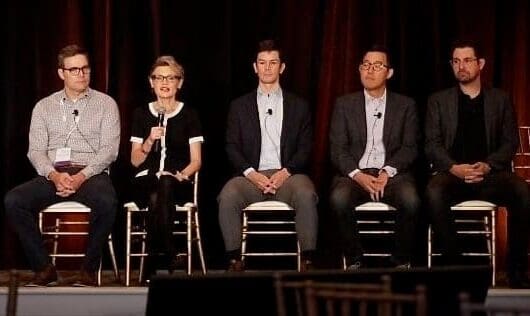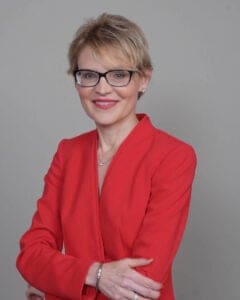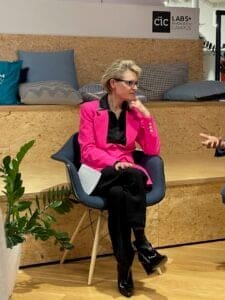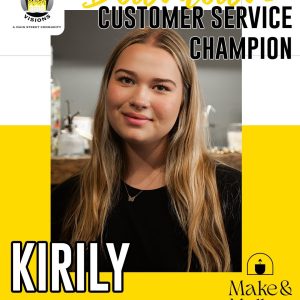Irene Rombel is used to being “one of the guys” as she’s made her presence known in an array of male-dominated fields.
“When I was a hedge fund analyst, I would go into these giant investor conferences, and I’d be one of the few women in the room, but I would always sit at the front,” she said. “And I’m always better prepared than most people, so I can hold my own.”
 She quoted actress, singer, and dancer Ginger Rogers who has been credited with saying, that she did everything her dance partner Fred Astaire did, but “backwards and in high heels.”
She quoted actress, singer, and dancer Ginger Rogers who has been credited with saying, that she did everything her dance partner Fred Astaire did, but “backwards and in high heels.”
New Zealand-born Rombel co-founded the BioCurie “techbio” company in May 2021.
While biotech companies have been around for decades, Rombel said techbio is a very new term to describe companies whose primary focus is technology.
“We don’t actually, for example, do wet lab experiments or anything,” she said, explaining that her BioCurie develops AI-driven software for cell, gene, and nucleic acid therapy therapy production.
RELATED: Aqua Science Owner Iwona Evans survived a career pivot and pandemic launch
It aims to revolutionize the manufacturing of advanced therapies that can treat human diseases with genetic disorders, such as cancer or muscular and retinal dystrophies, for example.
“Our goal is to help bring these powerful life-saving therapies to patients because today, they’re not affordable,” Rombel said. “They cost anything from half a million dollars to several million dollars a patient, which is not tenable, and it’s not a sustainable business model.”
The industry as a whole, she said, is very motivated to get the costs down as well and bring the therapies to markets much faster.
“Because even today, they’re very hit or miss,” Rombel said. “It takes too long. Patients sometimes die while they’re waiting for their therapies, and the quality is not reproducible and there’s all those issues with manufacturing.”
Rombel said a major challenge she’s experienced as a female business owner is the lack of venture capital funding.
“Women get a very tiny percentage of the VC funding, so that’s always a challenge,” she said. “It’s the money that you need to build a company, and for women, it’s very low what they raise, so that’s inherently and intrinsically a challenge.”
According to the World Economic Forum, in the U.S., women-founded startups raised just 2% of the total capital invested in venture capital-backed startups in 2023.
But Rombel said she never thought twice about entering a male-dominated field that often lacks proper funding for women.
In the Cure’s Health AI for Good Challenge, BioCurie was one of five out of 200 global contestants that won an award, and was the only women-owned business to be honored.
While BioCure’s operating budget and number of employees is confidential, Rombel said the company accepts many interns, notably from Delaware Technical Community College.
“I’m a mentor to young people in general,” she said, adding she doesn’t only mentor women. “I’m a mentor to many of the interns that I’ve had, and I work closely with them. The interns love working for us and they’re fantastic.
She said she and her husband have “one-track minds” in terms of being very work-driven. But Rombel runs for an hour every day, which allows her to decompress, she said.
She has a doctorate in biochemistry and completed stints as a post-doctoral research fellow at the University of California, Berkeley, and UC Davis.
She also earned an MBA from Southern Methodist University while serving as a faculty member at the University of Texas Southwestern Medical Center.
Rombel, who settled in Delaware in 2009 after her journey from New Zealand to California to Texas, has two sons, one at Delaware Tech and another at the University of Delaware.
The Wilmington area and surrounding region is a hub for her type of work, particularly highlighting that the National Institute for Innovation in Manufacturing Biopharmaceuticals (NIIMBL), is here.
She pointed out how Philadelphia is the birthplace of cell therapy.
“Because of the nature of our business, this is a great place to build a company like BioCurie,” Rombel said. “It’s not as if we need a gigantic infrastructure. We’re in a software company, so this is perfect, and there’s a lot of expertise here in Delaware.”
RELATED STORIES:

Raised in Doylestown, Pennsylvania, Jarek earned a B.A. in journalism and a B.A. in political science from Temple University in 2021. After running CNN’s Michael Smerconish’s YouTube channel, Jarek became a reporter for the Bucks County Herald before joining Delaware LIVE News.
Jarek can be reached by email at jarek@delawarelive.com or by phone at (215) 450-9982. Follow him on Twitter @jarekrutz and on LinkedIn.
Share this Post
















